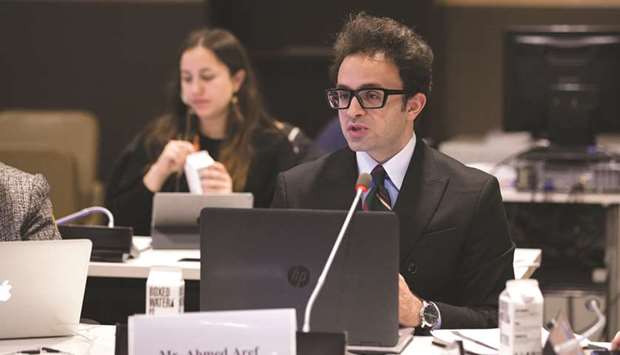Qatar has underscored its great efforts to implement the goals stated in Qatar National Vision 2030, which included coherent strategies in which development projects and strategies are in line with the goals of the Commission for Social Development in particular and the United Nations in general.
This came in a statement made by HE Ghanem Mubarak al-Kuwari, assistant undersecretary for social affairs at the Ministry of Administrative Development, Labour and Social Affairs, before the 58th session of the UN Commission for Social Development, which started last week.
HE al-Kuwari stated that Qatar is seeking, through the competent authorities, to provide adequate and appropriate housing for all, as the housing law, which regulated the use of the appropriate housing, covers all segments of society, where the law regulates the use of the right to housing in terms of “housing with a loan” for those who can pay off the scheduled loan, and accommodate those in need for those covered by the social security programme.
He also pointed out the advantages of the housing law, including long-term financing in comfortable instalments, the provision of lands intended for construction without cost, drawing approved engineering plans, providing basic services such as electricity and water, and demolishing and rebuilding old homes and maintaining them for citizens at no cost.
The official praised the ministerial decision on specifying the conditions and specifications for suitable housing for workers, as this decision included all specifications related to providing a suitable housing for expatriate workers in accordance with recognised international standards, set the minimum and necessary health requirements for workers’ housing, which is subject per the law to sudden periodic inspection by the Labour Inspection Department at the ministry.
He pointed out that Qatar is building several residential cities for workers that comply with these requirements per advanced strategies.
The assistant undersecretary added that the primary goal of the population policy adopted by Qatar for 2017-2022 is (achieving a balance between population growth and the requirements of sustainable development, in a manner that guarantees a decent life for the residents of Qatar, raises their capabilities, expands their options, and raises the levels of their participation in the progress of Qatari society).
On protecting and promoting the rights of women, children, the elderly, and persons with disabilities, he noted the recent decision of the Council of Ministers to establish the National Committee for Woman, Child, Elderly and Persons with Disabilities Affairs.
He pointed out that the National Committee has granted wide powers to protect and promote the rights of these groups, including monitoring their conditions, proposing the necessary ways to promote and follow up the achievement of the goals contained in international agreements and covenants ratified by Qatar related to their rights, studying the legislation related to them, and proposing to amend them to comply with international
agreements ratified by Qatar.
HE al-Kuwari expressed the aspiration of Qatar to build an effective social protection system for all Qataris that takes into account their civil rights, appreciates their effective participation in the development of society, and provides them with sufficient income to maintain dignity and health.
He stressed that social protection in Qatar is an essential component of an integrated methodology for sound social development aimed at achieving development for its citizens, and building a safe and stable society.
He explained that the framework of the social protection strategy is based on three pillars on which the basis of the strategic priorities was determined: social welfare,
social capital, and the family.
The official stated that social welfare in Qatar is based on the establishment of an integrated, effective, and sustainable social welfare system that works to develop social protection systems and legislation and enhance opportunities for career and social rehabilitation for the vulnerable segments.

Difi researcher Ahmed Aref at the session.
